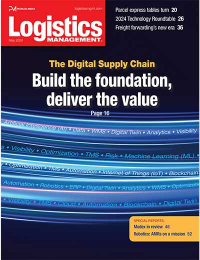New six-year contract between PMA and ILWU is formally approved
ILWU said that 75% of its membership voted in favor of approving the new contract. And it added that this new agreement protects good-paying jobs in 29 West Coast port communities, maintains health benefits, and improves wages, pensions, and safety protections.

After coming to terms on an agreement on a six-year tentative deal in mid-June, the International Longshore Warehouse Union (ILWU) and the Pacific Maritime Association (PMA) said late yesterday that the new contract has been formally approved.
The ILWU represents port workers in California, Oregon, and Washington, with more than 30% of U.S. incoming container traffic moving through West Coast ports at the Ports of Los Angeles and Long Beach, according to industry estimates. The PMA represents shipping lines and terminal operators at 29 West Coast ports. The previous contract between the parties, which expired on July 1, 2022, represents more than 22,000 dockworkers at all 30 U.S. West Coast ports. The new six-year contract is retroactive to July 1, 2022 and will run through July 1, 2028.
ILWU said that 75% of its membership voted in favor of approving the new contract. And it added that this new agreement protects good-paying jobs in 29 West Coast port communities, maintains health benefits, and improves wages, pensions, and safety protections.
“The negotiations for this contract were protracted and challenging,” said ILWU President Willie Adams in a statement. “I am grateful to our rank and file for their strength, to our Negotiating Committee for their vision and tenacity, and to those that supported giving the ILWU and PMA the space that we needed to get this result.”
PMA President and CEO Jim McKenna said in a statement that this contract provides an important framework for the hard work ahead to overcome new competitive challenges and to continue to position the West Coast ports as destinations of choice for shippers worldwide.
“From San Diego to Bellingham, these ports have long been the primary gateways for cargo coming into and leaving the United States, and our interests are aligned in ensuring they can effectively, and efficiently, handle the capacity growth that drives economies and jobs,” said McKenna.
Prior to the tentative agreement made in mid-June, there was a “cooling off” period in negotiations, which went into effect just days prior to it, with Acting Department of Labor Secretary Julie Su taking an active role in brokering a new deal. Prior to this, there had been various labor actions going back to earlier in June, in which PMA said that ILWU had staged what it called “concerted and disruptive work actions that have slowed operations at key marine terminals at the Ports of Los Angeles and Long Beach, and elsewhere on the West Coast, including the Ports of Oakland and Seattle.”
These tactics included union leaders refusing to dispatch workers to marine terminals, slowing operations, and making unfounded health and safety claims, according to PMA. And it added that these tactics raised the concern of forcing retailers, manufacturers, and other shippers to shift cargo away from the West Coast to ports on the Atlantic and Gulf coast, also noting that much of the diverted cargo may never return to the West Coast.
ILWU and PMA said in a joint statement, at that time, that they would not be releasing details of the agreement, and they also said it is subject to ratification by both parties.
“We are pleased to have reached an agreement that recognizes the heroic efforts and personal sacrifices of the ILWU workforce in keeping our ports operating,” said PMA President James McKenna and ILWU President Willie Adams. “We are also pleased to turn our full attention back to the operation of West Coast ports.
That attention will largely go towards import shipments geared towards the 2023 Peak Season in advance of the holiday rush. But many port operators and industry stakeholders maintain that Peak Season will be reduced this year, due to the combination of lower consumer demand and retailers still working off excess inventory levels, a situation which has been improving in recent weeks based on updates from some major retailers, including Walmart and Target.
Acting Department of Labor Secretary Su said that this deal shows that collective bargaining—though sometimes difficult— works.
“Thanks to the hard work and perseverance of the leadership of the ILWU and the PMA, the tentative agreement delivers important stability for workers, for employers and for our country’s supply chain,” she said. “This important milestone is welcome news to all, and on behalf of President Biden, we are pleased to congratulate both parties on what they have achieved.”
And National Retail Federation President and CEO Matt Shay said that a new agreement provides stability to the supply chain and assurance to the millions of businesses and employees who rely on smooth and efficient operations from the West Coast ports.
“The West Coast ports are a critical artery for retailers and other businesses into the U.S. market,” he said. “We urge the parties to quickly ratify the tentative agreement to bring certainty back to the West Coast ports. It is essential to begin the negotiation process early for the next labor contract and avoid a future lapse in continuity.”
While details of the tentative agreement were not disclosed, Peter Tirschwell, Vice President at S&P Global Market Intelligence, said in a research note that prior to a deal being reached, the PMA and ILWU remained far apart, with the ILWU seeking wage increases of more than 70%, and the PMA countering at roughly 30%.
“Disruption at the ports upends supply chains, delaying delivery of a wide range of consumer goods as well as perishable agricultural exports,” he said. “Further disruption could come from upcoming, separate negotiations with the ILWU Office Clerical Union whose current contract expires on July 1.”
Noted intermodal expert Larry Gross, President of Gross Transportation Consulting, observed that it is great news to hear that a potential agreement has been achieved after 13 months of uncertainty.
“But with no details being released, substantial uncertainty remains,” he said. “The agreement will need to be ratified by the ILWU membership, a process that I’m told will take a month or so. I think that BCO’s will want to get some clarity on the prospects for ratification by the rank and file before they relax their guard. Once that clarity is achieved, I do expect to see some of the freight that has been diverted away from the West Coast to return over time, but not all. This agreement has come in time to save the Peak Season on the West Coast. However, overall import volumes will be tempered at best, so one shouldn’t expect a freight bonanza.”
On April 20 the ILWU said that it had reached a tentative agreement with the PMA “on certain key issues,” adding that talks are continuing on an ongoing basis until an agreement is reached.
“The union and the employer previously announced on July 26, 2022 that they had reached a tentative agreement on terms for maintenance of health benefits,” said ILWU in a statement. “The parties also issued a joint press release on February 23, 2023 announcing that they continue to negotiate and remain hopeful of reaching a deal soon.
According to a previous Wall Street Journal report, the April agreement was focused on terms for the use of automation on port docks, with the report adding that the largest remaining issues are for wages and pensions, stating that “shipping officials familiar with the talks saying that the ILWU is likely to expect a pay increase in the first year of the new contract to at least match a deal recently reached with an ILWU local chapter in Hawaii of 10%.” Terms of a new contract also are a factor, with the report saying that the PMA wanted a six-year contract and the ILWU wanted a two-year contract, with either deal being retroactive to the expiration of the previous contract in July 2022.
In late March, a group of national industry associations, largely representing shippers and freight transportation and logistics services providers, called on President Biden, in a letter, to take action, regarding the still-unresolved West Coast port labor negotiations between the PMA and ILWU.
“The labor contract has now been expired for over eight months,” the letter stated. “Negotiations have been ongoing for over ten months, with little to no progress towards a new long-term agreement. It is imperative that the administration work with the parties to quickly reach a new agreement and ensure there is no disruption to port operations and cargo fluidity.”
The letter’s authors added that it is encouraging the White House to offer mediation services to the parties in their negotiations in order to alleviate the current situation, explaining that the lack of labor certainty has led to significant cargo flows shifting away from the West Coast. And they observed that while there are other issues impacting West Coast ports, supply chain stakeholders, or “cargo interests,” have indicated they have shifted cargo, due to the stalled negotiations.
As previously noted, this is not the first time a contract between the parties has expired as port operations remained ongoing. And one does not have to go too far back to see how acrimonious negotiations were, as in 2015, in the months prior to the June 30 deadline, it required the U.S. Federal Mediation and Conciliation Service to step in to help the sides find a way to come to an agreement over stalled labor negotiations. What’s more, the ongoing tension between the parties subsequently resulted in hindered productivity and also was a contributing factor in port congestion on the West Coast, especially as it led up to the 2016 holiday season.

Article Topics
PMA News & Resources
New six-year contract between PMA and ILWU is formally approved 2023 State of Logistics: Ocean cargo ILWU and PMA come to terms on a tentative new six-year labor deal POLA and POLB each report annual May volume declines and sequential gains Q&A: FourKites’ Koepke examines major factors impacting global trade U.S. Chamber of Commerce calls on the White House to appoint a mediator to resolve ILWU-PMA standstill With deadline way past due, now is the time for a West Coast port labor deal to be struck More PMALatest in Logistics
Key benefits of being an Amazon Business customer with Business Prime USPS cites continued progress in fiscal second quarter earnings despite recording another net loss U.S. rail carload and intermodal volumes are mixed, for week ending May 4, reports AAR New Ryder analysis takes a close look at obstacles in converting to electric vehicles Norfolk Southern shareholders sign off on 10 board of directors nominees Between a Rock and a Hard Place Inflation and economic worries are among top supply chain concerns for SMBs More LogisticsAbout the Author
Subscribe to Logistics Management Magazine

Find out what the world's most innovative companies are doing to improve productivity in their plants and distribution centers.
Start your FREE subscription today.
May 2024 Logistics Management

Latest Resources














